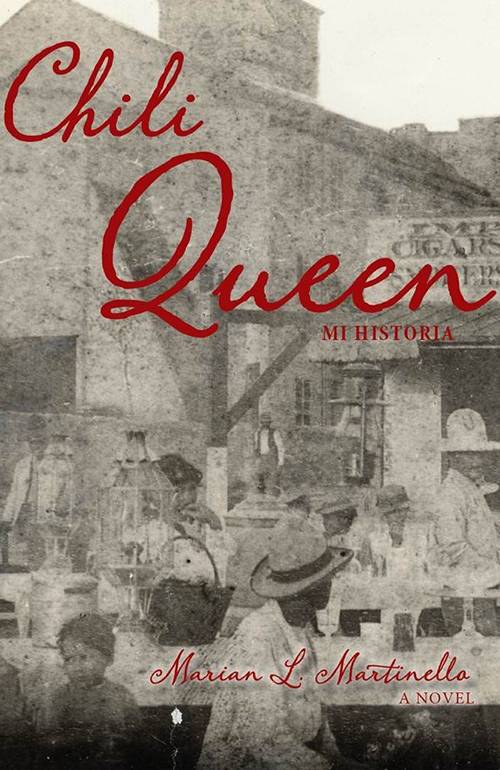Killer Queen

Chili Queen: Mi historia
by Marian L. Martinello
Forth Worth: TCU Press, 2015
200 pp. $22.95 paper
Reviewed by
Yvette Benavides
The Chili Queens of San Antonio served as the primary amusement for tourists and townspeople from the 1860s to the 1930s. The title of royalty wasn’t too far off the mark, as the women who worked in this cottage industry held court in public spaces—plazas and parks and in the city’s Market Square. A pre-cursor of food trucks and pop-up restaurants so popular today, the Chili Queens’ main objective and function was mainly culinary in nature. They served chili con carne, atoles, enchiladas, beans and coffee among other familiar snacks and entrees. The fare was riffing off of more traditional Mexican cuisine, a forerunner of what has come to be known as Tex Mex food. Marian L. Martinello also riffs off the traditional stories of the Chili Queens passed down orally or documented in the city’s newspaper in her novel Chili Queen: Mi historia. The historical fiction is inspired by true stories of these food vendors, and the book includes period photos, maps, and folklore to ground the story. All of these create a verisimilitude that balances the narrative.
Protagonist Guadalupe (Lupe) Pérez is seventeen, industrious, smart, and loyal to her family and their food vending business. They’ve put down stakes in San Antonio’s Plaza de Armas, a popular shopping area. After sundown, the plaza becomes a place to “have a good time.”
The narrative is buttressed by the aforementioned maps and facts—song lyrics and references to historical figures. And that’s where the book’s greatest strength emerges. What it offers about this rich time in Mexican American history in South Texas can’t be overestimated. This novel, in fact, would be effective in history or literature classes in middle or high schools.The author manages to excavate a captivating story not shared enough with younger generations. This book could succeed to inform a new generation of this important chapter in Mexican American history and popular culture. It provides suitable reading for young adults, particularly those not requiring the usual YA fare of vampires and teen angst.
The coming-of-age theme brims, but tepidly. Lupe’s worries are mainly about helping her family succeed and overcoming the stigma of a star-crossed love with Peter Meyer, a shopkeeper from the Hill Country who shares Lupe’s dreams and business acumen. The differences between Lupe and Peter are the most interesting parts of their romance. Sadly, Peter’s family objects to his wooing a Mexican American girl from a lower working class family. Lupe’s other worries are well-founded. Forces beyond her control cause the imminent failure of the family business. Lupe is confounded. Their food is delicious. Why aren’t they attracting customers the other Chili Queens so easily lure to their warm fires? Lupe observes that some of the other Chili Queens tell stories or provide music. Lupe’s entrepreneurial sense drives her to the same practices, but she does them even better. She weaves the mesmeric tales that draw in new customers. She captivates them with the delectable fare and a twirl of her rebozo.
Other characters wind though the novel, each new chapter bringing another person, another interaction that Lupe learns from and uses to survive even the threat of eviction of the family’s chili stand. Again, it is Lupe who must weigh her options and decide on a course of action.
One should not tackle these weighty conflicts on an empty stomach. Woven through the novel are recipes of authentic Chili Queen fare that stimulate all of the senses. These recipes make up a strong part of this vivid tale with endearing, well drawn characters that come to life in myriad authentic settings.
Marian L. Martinello was well versed in history and dedicated to studying the rich history of San Antonio and South Texas. Chili Queen: Mi historia was her first foray into historical fiction. Her previous publications include The Search for Pedro’s Story, The Search for Emma’s Story, Search for a Chili Queen: On the Fringes of a Rebozo. A respected and award-winning professor emeritus from UTSA, Martinello passed away on July 24, 2015, but her oeuvre will surely continue to be appreciated.
Yvette Benavides is a professor of English at Our Lady of the Lake University in San Antonio. She is the director of the MA/MFA program in Literature, Creative Writing, and Social Justice and the assistant director of the Center for Mexican American Studies and Research. She is a book critic for the San Antonio Express News and her commentaries have been featured on “The Texas Standard” and on Texas Public Radio. Her poems, stories and essays have been published widely, including works in Latina and Mothering magazines, Texas Observer, The Langdon Review of the Arts in Texas, The Bellevue Literary Review, The Pedagogy of Pop, and elsewhere.
